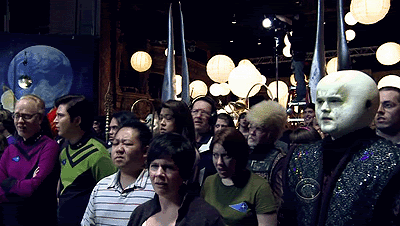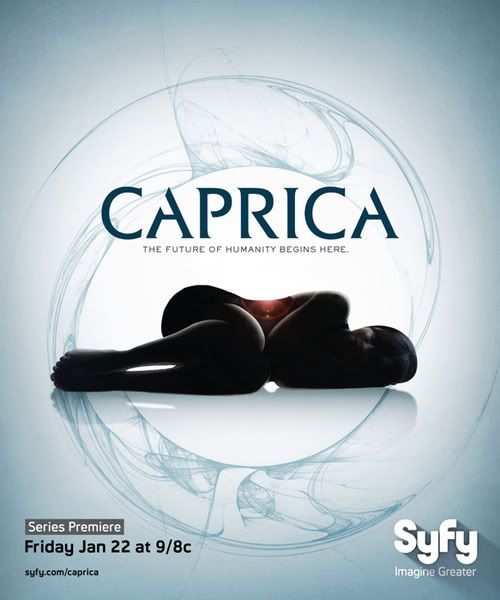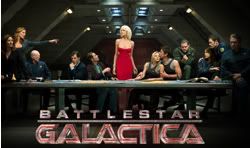(Greetings Colonial Refugees and Rebel Cylons - this is my first post as part of the Sitrep editorial team. Now that the show is over, I am excited to see this blog become a space for fans to continue to uncover the rich and complex meaning of different aspects of the show, and what it has to say about us (in addition to keeping on top of Caprica developments, DVD releases, books and articles that cover the show, etc). To that end, my first post is a little provocative, to spark some debate and get us all talking... )
Not In Our Stars: the Betrayals of the Battlestar Galactica Finale
by Sam J. Miller
“The fault, dear Brutus, is not in our stars, but in ourselves...”
Julius Caesar, Act I, Scene ii
The episode ends, and I stare at the screen. I've prepared myself for a soul-shattering ending, for horrible things, for these characters who I love so much to be dispatched in ways that make me sob and tremble and nod my head because I know, as much as it hurts, that it all makes perfect sense.
Because a huge chunk of what made Battlestar Galactica such a shockingly brilliant show was how much it rejected the cliches and easy answers of standard mainstream storytelling. Because characters were faced with real, challenging dilemmas, and things never ended in a tidy, cheery way. Because good people did terrible things. Because desperately flawed men and women somehow managed to be heroes, or find love. Because things were messy. And ugly. Just like life. Just like all great art. Yet the finale of Battlestar Galactica turned its back on all that, opting instead for the kind of shiny happy ending we associate with a far lower grade of television fare, and which its beautifully-damaged characters didn't deserve.
I'm on the losing side of this, I know, from the ton of time I've spent on message boards and blog comment pages, trying to come through my own sense of grief and loss and betrayal. Most fans loved the last episode. I loved the first half. The Caprica flashbacks were wonderful. Watching Roslin emerge from her grief and choose the life of service that would ultimately make her President and the savior of humanity was wonderful. Galactica jumping right in, inches away, face to face with the Colony. Boomer's moment of redemption. Hybrid Sam tricking the other hybrids. And finally—the song—Starbuck putting the pieces together—jumping Galactica to Gods know where—the ship's back breaking...
And that's when I started to feel sick. This lush green blue paradise, this answered prayer, this FUCKING! HAPPY! ENDING! Such bright sunshine was utterly out of character for Battlestar Galactica. The show's darkness did not derive from the lightless vacuum of space in which it was set, but rather in the hearts of the characters. Old Man Adama's words, uttered in the miniseries, became Battlestar Galactica's first article of faith: “we are the flawed creation.” We must answer for our mistakes. We get what we deserve. Passing into the promised land so easily, it felt like we'd suddenly switched to a whole new show. As the writer Alexander Chee said of the finale, “It felt like getting the fortune you don’t want from the fortune teller, not because you fear it, but because it is simplistic, and you know the fortune teller is lying.”
Battlestar Galactica resonated so deeply because it was it had the guts to be as dark and disturbing and depressing as the modern world itself. It was the show that could finally show us how ugly we are. I've always felt that the show was just 'finding itself' until the Pegasus showed up at the end of Season 2.0. It was always dark as fuck, but it also had whole episodes of humor and lightness (Ellen playing footsies with Lee in Tigh Me Up, Tigh Me Down) or glib political soap opera (Colonial Day) and spirituality (the Kobol arc)... and then here comes the Pegasus, with its gang rapes and magnificent evil lesbian and the plot to kill Adama, and Roslin saying "we have to kill her..." and from THERE, the show never faltered, as far as I'm concerned. there was never an episode that broke that vibe of unrelenting harshness. Sure, some were weaker or slower than others, and some were not SO focused on the ugliness, but even a more "laid back" episode like Taking a Break From All Your Worries is really all about torturing Baltar. And for me, the most brilliant perfect moment in the entire series was the discovery of nuclear-wasteland Earth at the end of Revelations. That exemplifies the extent to which Battlestar Galactica refused to coddle its viewers, or give them easy answers, or make them feel better about themselves and the world they live in. “So you've spent all this time looking for Earth? You've pinned all your hopes and dreams on finding Earth? You think all your problems will vanish when you find Earth? Well here, motherfrakker, here's your Earth—now what?” Our problems are in ourselves, not our circumstances or in the stars, and it's naïve to think that finding a new home or winning a million dollars will make us all into perfect beings.
Battlestar Galactica's strength was its darkness, and the series finale betrayed that darkness.
So. Three weeks go by. I fume and rant and rave. At meetings, I brood quietly until the end, at which point I lean across the table and say “do any of you watch Battlestar Galactica?” I read the endless back-and-forth in the comments field at the Sitrep, and on message boards, and the hundreds of reviews and analysis from all the people who fell in love with the show and are now dealing with this same profound loss.
Finally, I talk myself into watching it again.
And it was a good decision. Because by now at least I'm not surprised or shocked by the awful bits, and I can focus on the good things. And I'm crying like a baby for most of the last hour and eleven minutes.
The Starbuck ending worked, for me. The whole painstaking build-up. Plus I never wanted her to end up with Apollo, and I liked the realization that they were more brother and sister than anything else. Her use of the song to find the coordinates that lead humanity to Earth was a good fulfillment of all the “Kara Thrace and her Special Destiny” mumbo-jumbo, as well as the bigger-picture role of that song, beyond its centrality for the Final Five. Her sudden disappearance left me feeling suitably gobsmacked, and left just enough ambiguity and mystery to not feel cheap and easy.
Roslin has always been one of the most complex and interesting characters to me, and the finale did not do justice to her role as the leader of the fleet, the civilian counterpart to Adama's military authority. What happened to the kick-ass Roslin whose steady hand and icy determination saved the human race from extinction time and time again? The dying leader who really did lead the caravan of the heavens to its new home? If the new non-wasteland Earth had any value, it's this—it fulfilled the prophecy, it gave Roslin her resolution. I mean, come on, I know she was dying, and all, but this is Roslin, for gods' sakes. She can kill somebody by narrowing her eyes. Adama could have turned to her and said “you did it.” Even better, she could have whispered to herself “I did it.” After all the hard decisions she had to make, arriving at Earth was her victory.
In Resurrection Ship, Part Two, when Adama asks Athena why the Cylons hate us so much, she refers him back to his own words. “You said, 'Man never asked itself why it should survive.' Maybe you don't.”
That's what sticks in my throat, watching us arrive at paradise. What if we don't deserve a happy ending? What if going through hell is no guarantee you'll get into heaven? What if, in the end, our mistakes and offenses are so great that we can't come back from them? If anything, the fourth season showed us the human race becoming even more desperate, dark, and violent. Like hunted animals. Matching the Cylon genocide with a genocide of our own, by destroying the Hub. Betraying our rebel Cylon allies by keeping Three for ourselves, after she was resurrected. Organizing a mutiny against your commanding officers, assassinating the elected representatives of the people as soon as they disagree with you. It would be one thing if the human race was learning from its mistakes, and deciding collectively not to be that selfish, flawed, greedy, violent, terrified community whose arrogance and aggressiveness sparked the Cylon holocaust in the first pace. Maybe then we'd deserve to have all of our dreams come true and end our days in a fertile sunny African valley instead of blown to bits in the dark and cold of space.
Lots of fans expressed outrage at the extent to which "God did it" was invoked as a final explanation for so many of our big questions. Head Six, the Opera House, what-the-frak-is-Starbuck. To me, the problem isn't god(s). The problem is a simplistic god, an ultimately benevolent power who is guiding everyone to a happy ending. I'm an agnostic, but I always loved the show's religious themes—because they were complicated. Think of Caprica Six, with a crazy glint in her eyes, telling Baltar "God is love”—right after God commanded the Cylons to commit genocide! That's a real, challenging, complex look at what god is—a force that commands men to love one another, and a force that men use to justify killing each other. That's what Battlestar Galactica always had up its sleeve—the idea that God might be a bad-ass evil motherfrakker who really is planning to wipe us all out. The idea that God might be a lie we tell ourselves to make us feel better.
“The fault, dear Brutus, is not in our stars, but in ourselves,” says Cassius, trying to talk his comrade into rising up against Julius Caesar. We take responsibility for ourselves, and we accept the consequences of our actions, because to live any other way is to doom ourselves to keep on making the same mistakes. The reason a deus ex machina feels so fraudulent is because it steals the power away from the characters. Their punishments and their victories are no longer determined by their actions and their characters, but by the artist's lack of guts.
One source of Battlestar Galactica's astonishing intelligence was the way it took such supremely kitschy source material and turned it into something so stark and real and dark and bare. There's so little, even amidst all the death and tragedy and emotion, that ever felt sentimental or mawkish or easy. So to see Ron Moore, God himself in the Battlestar Galactica universe, standing there reading a magazine at the end, was exactly the kind of kitschy too-clever winking-at-the-audience bullshit that the show had so studiously avoided all along. And if Battlestar Galactica managed to break out of the science-fiction ghetto, winning over crowds of critics and brand-new audiences who had never before paid much attention to the genre, it was in large part through its studious avoidance of the standard cliches of TV science fiction. None of the Star Trek magic is at play here—machines that give you anything you want, or transport you to wherever you want go. No one in Battlestar Galactica sits back in a comfortable chair and drinks Earl Grey; they try to make a coffee substitute by roasting algae, but it's just not the same. In fact, there are really only two things in the Battlestar Galactica universe that are not currently possible with our own technology: faster-than-light travel, and artificial intelligence that equals or surpasses our own.
Yet the finale dug deep into the treasure trunk of science-fiction cliché, and came up with a couple classics. The idea that human life originated on another planet, or that Adam and Eve were aliens, is so hackneyed that many science fiction magazines include it in their list of themes that they reject out-of-hand because they've been done to death (“A long time ago in a galaxy far, far away,” anyone?). So while I guess that being the mother of the human race as we now know it is a suitably major “reveal” for Hera, justifying all the hushed-voice talk about how important she is since before she was born, it also felt a bit too familiar.
And then there's that other science-fiction cliché, the one that has never been important in the Battlestar Galactica universe, and that all of a sudden becomes the ostensible motivation for the complete abandonment of Colonial civilization. Specifically: that technology is bad, dangerous, and we should abandon it. Granted, this cliché came out of the mouth of Lee Adama, who has always been full of crap and given to grandstanding, but still. It was trotted out front and center, and no one disputed it.
Galactica has always been too smart for this kind of easy analysis. The rebellion of the Cylons does not teach us that technology is evil and should be avoided—it teaches us that we must temper our use of technology with understanding, love, rationality, respect. The Cylons did not rebel because technology is evil; they rebelled because we enslaved them and made them fight our wars and dig our ditches and when you do that to sentient beings, you're going to piss them off, and you can be damn sure that they're going to fight back. We must not use technology to exploit and oppress others, for in doing so we sow the seeds of our own destruction. This is the lesson that Battlestar Galactica brought us, in the aftermath of 9/11. Sooner or later, the day comes when you can't hide from the things that you've done anymore. Violence begets violence, and technology will always be used to build better land mines, bigger bombs, tinier cameras to invade people's privacy, scarier biochemical weapons to use on civilian targets, etc. Think of how many scientific breakthroughs, including the internet, came about as a result of military spending—and think about how much of our national budget, even now, is spent on the military. Science is not value-neutral; we must not pretend that science and technology are inherently harmless or, worse, inherently good. Plain and simple: we must be responsible in our use of it, or we will destroy ourselves. We will continue to oppress others, who will, in turn, oppress us. All of this has happened before, and will happen again.
I should give the producers a certain amount of credit. They shocked and surprised me with this ending, because the one thing I never expected Battlestar Galactica to do was fall back onto kitsch and cliche and sappiness and sunny smiley New York City to make us feel at home.
But I'll be honest. In the end, the real source of my heartbreak is not in the content of “Daybreak.” Pure and simple, it's in the fact that the show is over. And while I don't buy the hype that the finale could not have met all of our expectations for it, after a second viewing and a lot of soul-searching I can accept that even a 100%-satisfying ending would not have eased this ache I carry around with me, on the bus in rush hour traffic or watching some vastly-inferior television show, realizing that I'll never see Michael Hogan's astonishing left eye again, or hear Roslin say that something is “essential to the long-term survival of this fleet,” or share the Old Man's disappointment in his son. That is what we're privileged to have shared. That's what has forever changed the landscape of television drama. That's what we'll always have, long after the betrayals of Daybreak have ceased to annoy us.

















